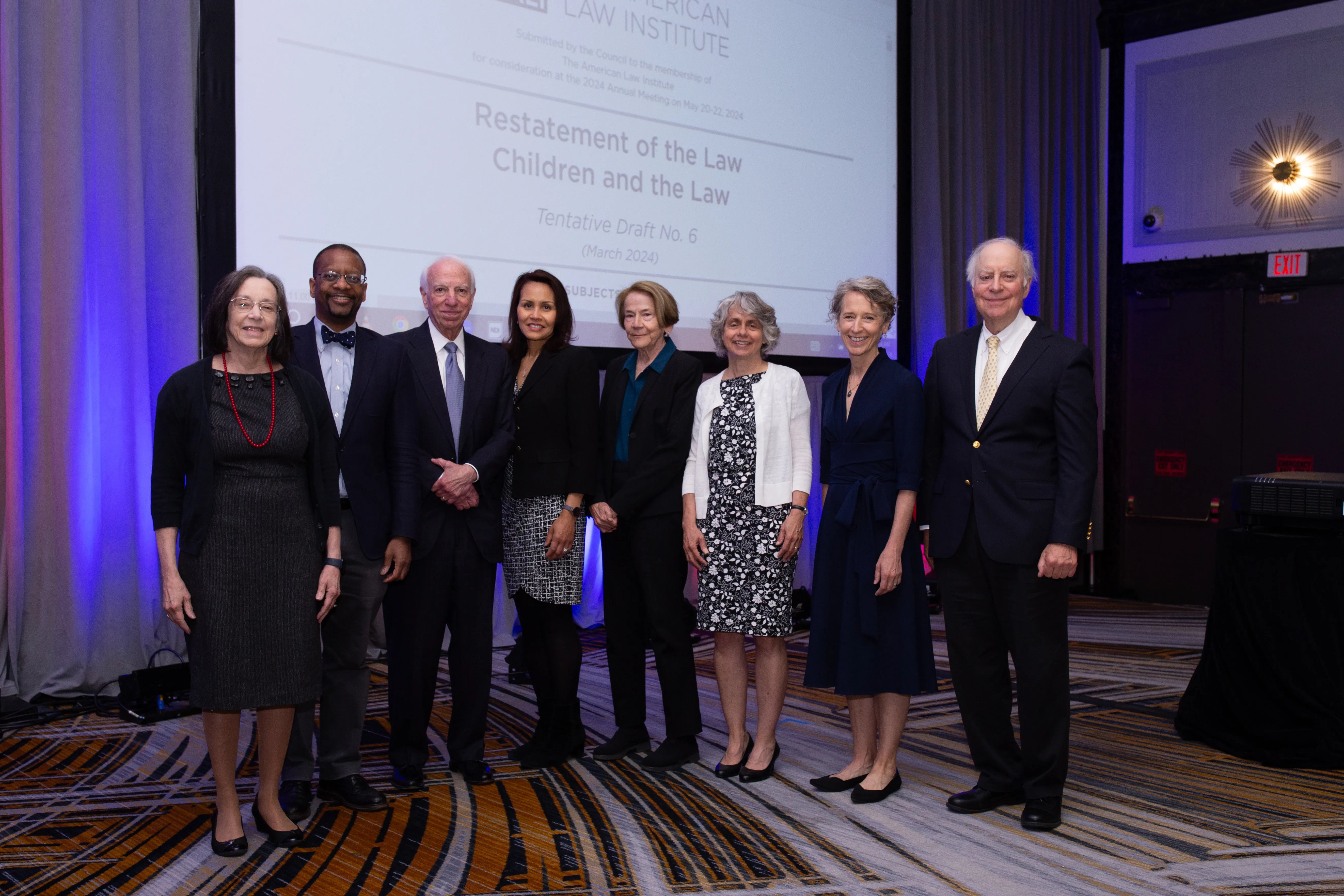Q&A: Emily Buss Discusses Her Work on the First Restatement on Children and the Law

The American Law Institute (ALI) recently approved a Restatement on Children and the Law, the first initiative of its kind to comprehensively examine the law governing children’s needs, rights, and obligations.
Emily Buss, the Mark and Barbara Fried Professor of Law, served as an associate reporter on the committee, contributing her legal expertise in the areas of children’s and parents’ rights. Buss recently answered some questions about her involvement with the Restatement on Children and the Law and on the Restatement’s contribution to the development of the law.
How does the Restatement on Children and the Law help advance the law in the area that it covers?
Restatements are not designed to make "big changes,” and they would not be relied upon by judges if they took that approach. At their best, however, they can significantly advance the law by offering clear descriptions and articulating underlying rationales that render the law more coherent. They can also detect and endorse emerging trends or minority positions in the cases that are consistent with those rationales and that support courts’ development of the law through the common law process.
Our Restatement advances the law affecting children by helping to draw together several fields, and, within them, topics, that have developed separately. Some areas of law we address have grown out of the common law addressing the rights and interests of children and their parents, but others have grown out of bodies of law focused on adults and adapted for children. The law governing children’s criminal offending and the law protecting children’s constitutional rights are two primary examples of adapted adult regimes. In articulating an underlying logic that ties these many diverse areas of law together, the Restatement advances the coherence of the law governing children.
A central focus on child well-being is a unifying theme that runs through the discussion of parental rights, the juvenile and criminal justice systems, the states obligation to educate children and children’s civil rights in and outside of school. This theme may sound obvious, but, in many areas of law, it has been poorly articulated. In addition, the relevance of developmental science has only recently begun to play a central role in the law’s account of child well-being. Applying these considerations, using common language, across a broad range of legal areas affecting children offers an important advancement in the development of the law.
This initiative took nine years to complete. Can you describe the kind of work that went into this process?
One of the strengths of the Restatement drafting process is that it requires several stages of input from field experts and accomplished lawyers and judges. Every draft section of the Restatement was reviewed, first by our group of ALI advisers, who included lawyers, judges and scholars with expertise on every aspect of the law affecting children. Much of our lengthy annual discussions with our advisers consisted of lawyers and judges offering us excellent insights from their own practice experience. Occasionally advisers raised serious challenges to some portions of our drafts, which led to productive reworking.
After we responded to the input of these expert advisers, our drafts were reviewed by the ALI Council, the leaders of the Institute. This group is comprised of leading scholars, judges, and practicing lawyers who take responsibility for overseeing the quality of all ALI projects. Each year a new set of Restatement sections was reviewed and critiqued by this group, before a final stage of redrafting and consideration by the full ALI membership. For any Restatement section, the process was generally two to three years long, from our initial drafting through approval by the ALI membership. Because this was the first Restatement on Children and the Law, and because we were addressing a very broad set of legal issues, it took us several iterations of that two to three- year process to complete the Restatement.
Two other aspects of the drafting and review process are worth noting. The first is the collaboration among the reporters. Because of its size, five reporters were assigned to this project, all legal academics with expertise on different, but overlapping, aspects of the law affecting children. Working together for nearly a decade was a terrific experience, highly collaborative and sometimes productively contentious.
The second aspect worth highlighting is the invaluable contribution made by our law students. The American Law Institute pays for research assistance supporting the Restatement without limit, and this allowed me to hire many students, roughly ten a year, to work on Restatement-related projects. Because there was so much work to do, I was able to assign work to fit students’ availability and interests. Some students helped gather and synthesize information, some students helped with editing, and some students had a chance to try their hand at drafting. We could not have done it without the fabulous assistance of our students, and I hope that the students found the work interesting and rewarding as well.
What was a major takeaway from your involvement in this project?
Anyone who engages in legal scholarship wants to think that her work will make a difference. In conventional legal scholarship, influence often comes from saying something new and controversial. Scholars aim for the eye-catching title and the argument, or empirical data, that challenges the status quo. There is nothing particularly eye-catching about a Restatement because the value of a Restatement to judges depends on its fidelity to established law. Any challenge it offers to the status quo is subtle, or so heavily justified that it reads like an endorsement of the status quo. I found the discipline and the humility required of Restatement work to be an intellectual challenge of its own, and a highly rewarding one.
Among the topics covered is free speech rights of minors. Could you discuss a bit about what the Restatement has to say about that?
Whether or not we should even include a discussion of children’s constitutional rights in the Restatement was a contentious issue. Restatements are traditionally focused on state common law, and adding federal constitutional law challenged this convention. On a practical level, there was concern that the Supreme Court could wipe out an entire section of the Restatement with a single decision. The issue was debated several times at meetings of the advisers and the council, but we successfully made the case that a consideration of the law affecting children that left out the federal constitutional law would be misleadingly limited. In fact, federal constitutional law undergirds a large portion of the law governing children in families and almost all of the law governing children in the justice system, in addition to playing the central role in establishing children’s civil rights.
Because of the vulnerability of children’s federal constitutional rights to significant doctrinal changes by the Supreme Court, I exercised particular care in drafting the sections addressing children’s speech and religious rights in school. I had an especially productive opportunity to collaborate with federal judges involved in the ALI Council in considering how to “restate” appropriately in this area, to capture long-standing understandings in a manner likely to remain stable through a predictably unstable period in constitutional law making. The hope is that, as courts face new issues implicating children’s speech rights in schools, including, for example, recent legislative trends aimed at preventing children’s access to information, the Restatement will offer a source that, without overclaiming, helps to preserve the protections the Supreme Court has already clearly established.
How do you hope this Restatement will impact children?
Many of the most important decisions affecting the lives of children and their families are made by state court judges lacking the time and funding to acquire comprehensive libraries, to hire law clerks, or even, sometimes, to engage in on-line legal research. For these under-resourced and often overwhelmed judges, the Restatement offers a single set of volumes to which they can turn for a wise and comprehensive understanding of the law. I have already seen scholars cite, extensively, from sections of the Restatement which have been accessible on Westlaw and Lexis as they were approved by the membership, and these citations are very gratifying, but it is the difference the Restatement can make for the judges deciding the fate of children on a daily basis that is most important.
